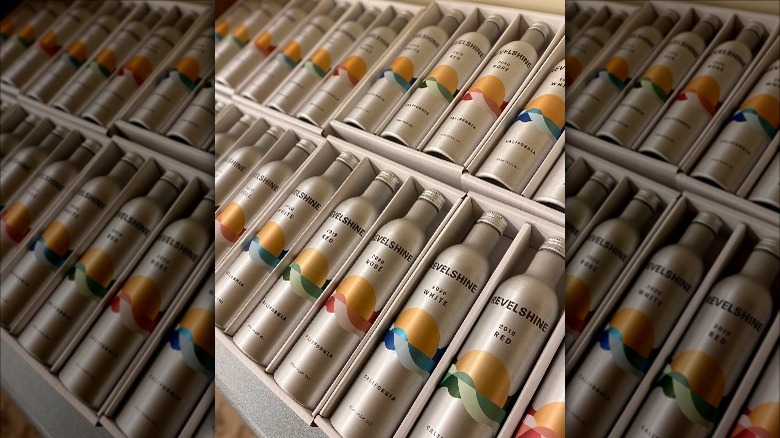Why Aluminum Bottles Could Be The Future Of The Wine Industry
The idea of using aluminum to store wine, among other alcoholic beverages, is not new. Many companies have turned to canned wine because of its many advantages both for their bottom line and the environment. According to Brewquets, aluminum is far more likely to be recycled and requires less fuel to ship. It can even keep the wine fresher since bottle openings and corks can allow air into the bottle where oxidation can occur (via Wine Folly). But several wineries have brought a whole new option to consumers looking for alternative options to glass or a larger bottle than a single-serving can.
According to Packaging World, Limerick Lane Cellars of Sonoma County, California, released Revelshine in August 2020. It includes a rosé, a red, and a white wine — all packaged in aluminum bottles. Additionally, Sterling Vineyards of Napa Valley, Chandon California, Apothic Red, and Bigsby's Folly have also begun packaging wine in aluminum bottles of various sizes.
The advantages to wine in aluminum bottles
Though the brands each use aluminum bottles ranging in sizes from two servings to a full bottle, there is an advantage to the many different sizes and options. While canned wine allows for a wide variety of brands and varietals, aluminum bottles allow those who know what they want to carry fewer containers without foregoing volume (via Brewquets).
Though the aluminum bottles include many similar benefits of canned wine, such as being lighter than glass bottles, easily recycled, and better at keeping wine cool (via Fox 5 NY), the new twist allows for more options than canned wine alone — including the ability to share a bottle with others. As Limerick Lane Cellars founder and owner Jake Bilbro told Packaging World, "Our goal was and is to ensure that consumers could get world-class wine in a manner that transports easily, is rugged enough for treks, seals completely, and is socially and environmentally responsible."
Though aluminum wine bottles might not have been an expected trend, it has certainly become a path forward for several wineries. Naturally, many winemakers could benefit from switching to aluminum instead of glass. Apart from the positive cost saving and environmental impacts, using aluminum bottles instead of solely glass could open up a wider market.

